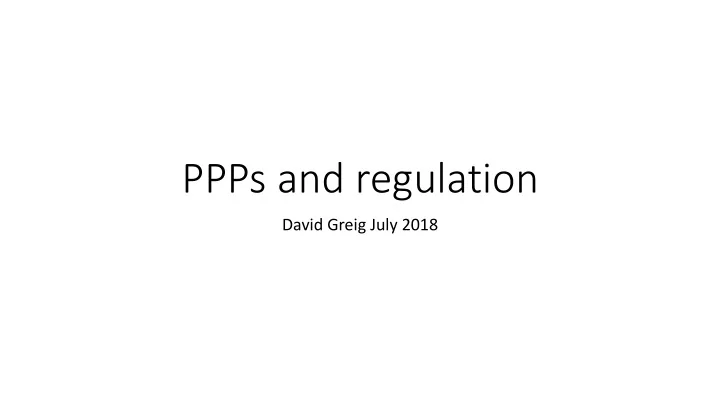

PPPs and regulation David Greig July 2018
Some basics • PPPs are long-term contracts – to build something, operate it and eventually hand it back • Economic regulation is usually to address market power • PPPs do not necessarily have market power • But managing a PPP post-construction phase may be similar what an economic regulator does: monitoring performance, adjusting prices, dealing with disputes and resetting in response to changing external circumstances • So, are the tasks of PPP management and of economic regulation much the same? Not always.
B ilateral negotiations, or a “regulator”? • If handled bilaterally, long-term contracts can lead to disputes and courts • Alternatively judgement from an independent entity (like a regulator), using flexibility and discretion, may reduce transaction costs: simpler contracts, lower dispute settlement costs • The case for the alternative assumes long-term contracts are "incomplete" – they face uncertainty and cannot anticipate external surprises. Hence they need monitoring, review, dispute settlement and change. • But PPP contracts are not always incomplete.
Conditions for not needing an external regulator 1. there are two large and experienced parties to the contract 2. demand and demand growth are for a defined product and is relatively predictable 3. the technology is stable and slowly evolving 4. investment needs are largely upfront 5. construction costs are reasonably certain 6. supply prices are likely to be reasonably stable. An example: the proposed Inland Rail PPP (Source: Dassiou and Stern 2008)
The Inland Rail PPP • The >$10b Inland Rail project will connect Brisbane and Melbourne, mainly west of the Great Dividing Range • The hard part, through difficult terrain near Toowoomba, will be a PPP, to encourage engineering and construction innovation • This PPP is unlikely to need regulator-type skills because: 1. the parties to it will be experienced 2. demand (containers, coal, grain) is predictable. There will be spare capacity 3. the technologies are stable, evolving slowly 4. investment is largely upfront. Ongoing maintenance costs will be minor 5. construction costs will be covered through the bidding process 6. supply prices will be relatively stable.
New Zealand experience • NZ PPPs: two motorways,10-12 schools, three prisons (one including prison operation). Most have payments based on availability KPIs • motorway example: KPIs by output (e.g. lane availability) and outcomes (e.g. travel time), operator responsible for all accidents, contract period typically 25 years, handback surveys two years prior • most resets during the contract period are market or index based • PPP contractors report to the sector (e.g. transport) agency, which reports to the Treasury • the incomplete contract problem has not been significant.
The other extreme: Victorian rail franchising • The initial (1999) franchising had PPP characteristics: upfront investment, ongoing performance subject to KPIs, fare maxima, handback after 15 years. (The current model is simpler). • The contract was clearly "incomplete" with interpretive disputes, measurement problems and demand surprises. The main private investor pulled out part way through • However the complexities were beyond what an external party would normally deal with – including subsidy policies, wider transport policies and major new projects • Contract management remained bilateral.
Urban motorways: incomplete contracts • Urban motorway PPPs often are incomplete contracts that need regulator-type skills to manage • For example, other roads may that compete with the PPP may be proposed (with on/off/on politics) or built (hence lead to disputes). Or they may instead feed traffic to it • Unforeseen new property/industrial developments may generate traffic and hence a need for more capacity, (potential renegotiation) • Both sides may increasingly see a case for peak/off peak pricing (potential renegotiation)
Conclusion • The argument for having an external party manage a PPP contract depends on its “incompleteness” – the extent to which there will be surprises. Otherwise “set and forget” as in Demsetz competition • Most cases considered here did not warrant using an external party, essentially because they are simple – whether small (a school) or large (a major non-urban railway). One was too complex, entwined with other issues • But use of regulator-type skills may be more relevant in intermediate cases, e.g. clearly defined projects in changing circumstances such as urban motorways. See the main paper for sources and acknowledgements.
Recommend
More recommend